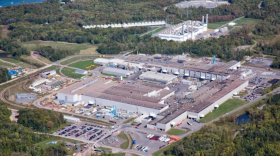A large solar array is in the works in Jefferson County. A Colorado-based developer plans to fill twenty acres of private farmland in Philadelphia with solar panels by this time next year.
New York state has agreed to pay 20 percent of the $11 million it will cost to build enough solar panels in Philadelphia to produce 4 megawatts of energy. That's enough to power 700 homes without emitting carbon or burning fossil fuels.
Todd Stewart is with Solar Power Financial, a developer based in Boulder. He says they first looked at expanding in East Coast states that have a longer history of welcoming solar than New York does, but they liked the way the state's incentives worked.
"In New York state the incentive is structured as an up-front payment, it's paid over three years and it's based on production of a system," Stewart said. "All very known and predictable things. "
New York has yet to hand over the money to Solar Power Financial. They have to guarantee they have customers for their energy first. Stewart says New York Air Brake and Renzi Foodservice, both based in Watertown, have shown interest, but a spokesman for New York Air Brake declined to comment except to say it’s far too early in the process.
Stewart also says investing in solar power in New York makes sense. Next to California, Hawaii and Alaska, New York has the highest utility prices in the country. Stewart says if the state invests in renewable energy now, New York will be one of the first states to make solar energy profitable.
"That's perfect," Stewart explained. "That's how you build a market. The market gets more mature and more efficient and prices come down, and we are able to build systems with less and less incentives until ultimately there are no incentives from the state and then we are at what we call grid parity, where solar is able to compete directly with all the energy generating resources that are out there. "
The hope is that the solar industry will make electricity cheaper for consumers and better for the environment.







